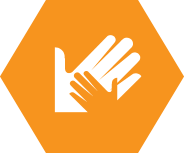Hate Crimes and Incidents (Racism, Prejudice and Discrimination)
Hate crimes and hate incidents
In most crimes it is something the victim has in their possession or control that motivates the offender to commit the crime. With hate crime it is ‘who’ the victim is, or ‘what’ the victim appears to be that motivates the offender to commit the crime.
A hate crime is defined as ‘Any criminal offence which is perceived by the victim or any other person, to be motivated by hostility or prejudice based on a person’s race or perceived race; religion or perceived religion; sexual orientation or perceived sexual orientation; disability or perceived disability and any crime motivated by hostility or prejudice against a person who is transgender or perceived to be transgender.’
A hate incident is any incident which the victim, or anyone else, thinks is based on someone’s prejudice towards them because of their race, religion, sexual orientation, disability or because they are transgender.
Not all hate incidents will amount to criminal offences, but it is equally important that these are reported and recorded by the police.
Evidence of the hate element is not a requirement. You do not need to personally perceive the incident to be hate related. It would be enough if another person, a witness or even a police officer thought that the incident was hate related.
Types of hate crime
Hate crime can fall into one of three main types: physical assault, verbal abuse and incitement to hatred.
Physical assault
Physical assault of any kind is an offence. If you’ve been a victim of physical assault you should report it. Depending on the level of the violence used, a perpetrator may be charged with common assault, actual bodily harm or grievous bodily harm.
Verbal abuse
Verbal abuse, threats or name-calling can be a common and extremely unpleasant experience for minority groups.
Victims of verbal abuse are often unclear whether an offence has been committed or believe there is little they can do. However, there are laws in place to protect you from verbal abuse.
If you’ve been the victim of verbal abuse, talk to the police or one of our partner organisations about what has happened. You’ll find a list of them on our How to report hate crime page.
Even if you don’t know who verbally abused you, the information could still help to improve how we police the area where the abuse took place.
Incitement to hatred
The offence of incitement to hatred occurs when someone acts in a way that is threatening and intended to stir up hatred. That could be in words, pictures, videos, music, and includes information posted on websites.
Hate content may include:
- messages calling for violence against a specific person or group
- web pages that show pictures, videos or descriptions of violence against anyone due to their perceived differences
- chat forums where people ask other people to commit hate crimes against a specific person or group
What can I do if I experience any of the above?
If you would like to talk to somebody about your experience in a confidential and safe space, you could contact or book an appointment with the GSA Advice Service. An advisor will be able to give you some information on what your options are, and you can decide whether you wish to take any action. We can also signpost and make referrals to specialist services who would be best-placed to advise you in your situation.
If you have experienced any racism or other hate crime on campus, you can report it to the University.
Outside of the University you can also report hate crime to the following organisations:
Additional Resources
- Victim Support
Offers free, confidential, and independent support to help you move beyond the impact of crime. - Stop Hate UK
Stop Hate UK is a leading national organisation working to challenge all forms of Hate Crime and discrimination, based on any aspect of an individual’s identity.
Racism
- York Racial Equality Network
A local organisation that aims to reduce racial inequality in York. They provide a number of services, including being a hate crime reporting centre.
Antisemitism
- JAMI
Provide professional, person-centered treatment and support for young people and adults with mental health needs, as well as for their families and carers. - Community Security Trust (CST)
Trained in antisemitism and security, they have a 24 hour national emergency number: 020 8457 9999. - Union of Jewish Students (UJS)
UJS partner with JAMI and CST to produce a comprehensive guide to antisemitism.
LGBTQIA+
- Galop
Support for LGBTQIA+ people who have experienced abuse and violence. - Switchboard LGBT
Are a safe space for anyone to discuss anything, including sexuality, gender identity, sexual health and emotional well-being. 0800 0119 100. Open 10:00-22:00 every day - LGBT Foundation
LGBT Foundation provide a wide range of services to support lesbian, gay, bisexual and trans people.
Anti- Muslim hatred and Islamophobia
- Tell MAMA
Measuring Anti-Muslim Attacks (MAMA) is a secure and reliable service that allows people from across England to report any form of Anti-Muslim abuse.
Disability
- Scope
Provide practical information and emotional support when it’s most needed, and campaign relentlessly to create a fairer society. - Disability Rights UK
Disability Rights UK is the UK’s leading organisation led by, run by, and working for Disabled people.

